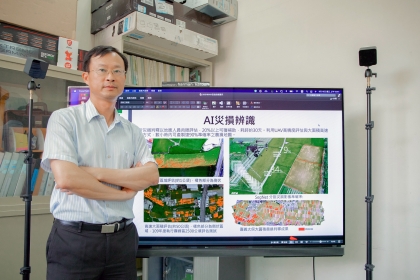Professor Yang’s Drone Team Is Committed to Precision Agriculture, Allowing Farmers to Use Their Mobile Devices to Patrol the Fields
2021-11-30 16:44:23
興新聞張貼者
Unit秘書室
1,723
Distinguished Professor Ming-Der Yang in Department of Civil Engineering, National Chung Hsing University led a team integrating drones and artificial intelligence and being committed to monitoring on hillsides and catchment areas decades ago. As the development in Internet of Things, the team further successfully applied advanced image processing technology and 3D modeling in precision agriculture. Professor Yang won the 2020 Outstanding Research Award from Ministry of Science and Technology for his excellent work applying Unmanned Aerial vehicle (UAV) and intelligent artificial (AI) to environmental and agriculture monitoring. Yang’s ultimate goal of UAV patrol combined with AI is to make Taiwan’s land better used and cared in an all-round way. Encountering extreme climates, farmers will "depend on mobile devices for harvest" rather than "depend on heaven for harvest".
Since Typhoon Morakot, Professor Yang integrated UAV and image processing technology to monitor slopes and investigate disaster in mountains and forests to assist the government in making proper decisions. For more a decade, he has been committed to monitoring and protecting the land of Taiwan. Professor Yang's efforts have been affirmed: "Real-time identification of crop losses using UAV imagery" won both "Breakthrough Award" and "Best Popularity Award" in 2019; "Air/ground cooperation for optimal rice harvesting model" won both "Future Technology Award” and "Best Popularity Award" in 2020 consequently; "AI Model of Mask Deployment Optimization" won the Second place in the "AI Creativity Contest" sponsored by CTCI Foundation in 2020; "Smart Rice Helper" won the Silver Award in the "Data Innovation Application Contest" in 2021.
Uber's business model also inspires Professor Yang to build a cloud data processing platform for UAV crowd sourcing, allowing to monitor crop growth and disaster damage in an accurate and rapid way. After joining the platform, legally qualified drone operators can be matched by offering flight missions through cloud matching process. Both UAV data users and providers can benefit from this platform by "turning toys into tools" to achieve a win-win situation. As Professor Yang disclosed, this advancement of UAV service subsequently will advance from rice to remunerative crops and take the next step to promote the "Drone Uber".
Professor Yang pointed out, “with the widespread UAV applications in the commercial field, Taiwan has mature AI research and development talents and a high-tech industrial chain so to take certain advantages in the competition of the UAV market. What we should do is to expand the UAV market and attract more talents to devote to the aerial industry. Taiwan will have infinitely broad space and possibilities in the future applications of UAV combined with AI.”
Since Typhoon Morakot, Professor Yang integrated UAV and image processing technology to monitor slopes and investigate disaster in mountains and forests to assist the government in making proper decisions. For more a decade, he has been committed to monitoring and protecting the land of Taiwan. Professor Yang's efforts have been affirmed: "Real-time identification of crop losses using UAV imagery" won both "Breakthrough Award" and "Best Popularity Award" in 2019; "Air/ground cooperation for optimal rice harvesting model" won both "Future Technology Award” and "Best Popularity Award" in 2020 consequently; "AI Model of Mask Deployment Optimization" won the Second place in the "AI Creativity Contest" sponsored by CTCI Foundation in 2020; "Smart Rice Helper" won the Silver Award in the "Data Innovation Application Contest" in 2021.
Uber's business model also inspires Professor Yang to build a cloud data processing platform for UAV crowd sourcing, allowing to monitor crop growth and disaster damage in an accurate and rapid way. After joining the platform, legally qualified drone operators can be matched by offering flight missions through cloud matching process. Both UAV data users and providers can benefit from this platform by "turning toys into tools" to achieve a win-win situation. As Professor Yang disclosed, this advancement of UAV service subsequently will advance from rice to remunerative crops and take the next step to promote the "Drone Uber".
Professor Yang pointed out, “with the widespread UAV applications in the commercial field, Taiwan has mature AI research and development talents and a high-tech industrial chain so to take certain advantages in the competition of the UAV market. What we should do is to expand the UAV market and attract more talents to devote to the aerial industry. Taiwan will have infinitely broad space and possibilities in the future applications of UAV combined with AI.”


